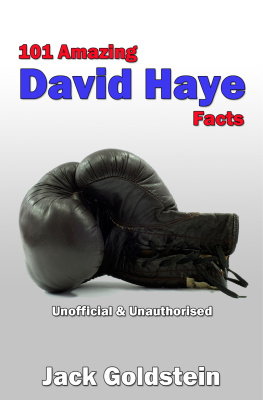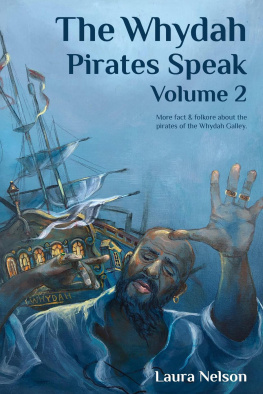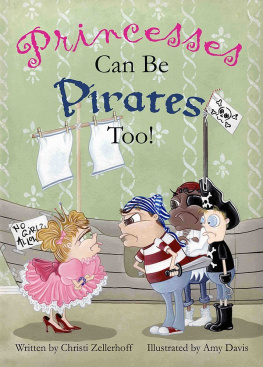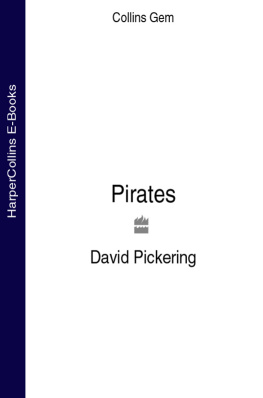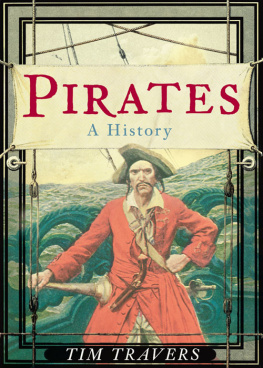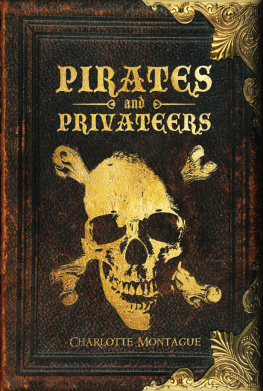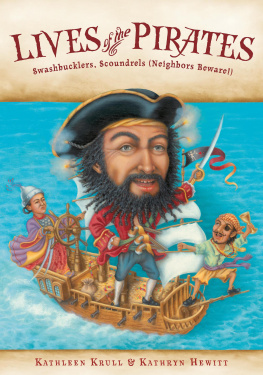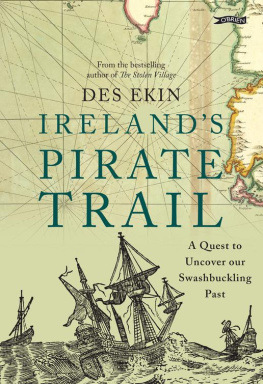Title Page
10 AMAZING PIRATES
Jack Goldstein
Publisher Information
Published in 2014 by
Andrews UK Limited
www.andrewsuk.com
The right of Jack Goldstein to be identified as the author of this work has been asserted by him in accordance with the Copyright, Designs and Patents Act 1998
Copyright 2014 Jack Goldstein
All rights reserved. No part of this publication may be reproduced, stored in a retrieval system, or transmitted, in any form or by any means without the prior written permission of the publisher, nor be otherwise circulated in any form of binding or cover other than that in which it is published and without a similar condition being imposed on the subsequent purchaser. Any person who does so may be liable to criminal prosecution and civil claims for damages.
All information contained within this book has been researched from reputable sources. If any information is found to be false, please contact the publishers, who will be happy to make corrections for future editions.
Introduction
Arr matey! Do you want to know all about the ten most fantastic, fearsome and famous pirates of all time? Dare you read of how Francois LOlonnais ripped out a mans heart with his bare hands then gnawed at it like a ravenous wolf? And what of Sir Henry Morgan - callous pirate or loyal privateer? How did Cheung Po Tsai build up a fleet of six hundred ships, and what happened to Anne Bonny after she was caught? Suitable for sea-faring folk and land-lubbers alike, this fantastic book introduces the reader to the ten pirates throughout history who surely were the greatest of their age.
Follow Jack Goldstein on Twitter @GoldsteinBooks
Visit Goldstein Books at www.jackgoldsteinbooks.com
William Kidd
William was born in Dundee, Scotland in January 1645. He was from a naval family - his father John was a sea Captain and was tragically lost at sea when William was a boy. Little is known of his years growing up, although some sources suggest that as a young man he spent some time as a seamans apprentice on a pirate ship.
Kidds later career as a pirate is perhaps one of the most disputed out of all of those featured in this book. The reasons for this are in effect fairly simple; there is a fine line between a privateer and a pirate . Privateers - or corsairs searched the high seas for enemy vessels, attacking them and plundering their cargo... although they did this with permission from their government. Just as one mans terrorist is another mans freedom fighter, privateer and pirate are surely interchangeable depending on whose side you are on! Kidd, however, is fairly unique in that it was his own country that felt his actions were rather on the illegal side.
Our journey starts in 1689 with Kidd as a crewman on a ship sailing in the Caribbean. For reasons that are not recorded, the sailors mutinied against their captain (again, whose name we do not know) and sailed to a nearby British colony. The rest of the crew voted for Kidd to become their new captain; his first job was to offer (along with a small number of other vessels) protection from the French to the governor of Nevis. Whilst the man in charge was keen to have the protection, he wasnt so keen to pay for it, so he suggested that the newly-appointed privateer captain could take his pay from the French. Kidd duly did this, attacking and looting the island of Mariegalante. For the next five or six years, Kidd made plenty of money operating as a privateer, even marrying a young woman named Sarah Bradley Cox Oort. Sarah was twice widowed, and due to the inheritance she received from her first husband, she was already one of the wealthiest women in New York!
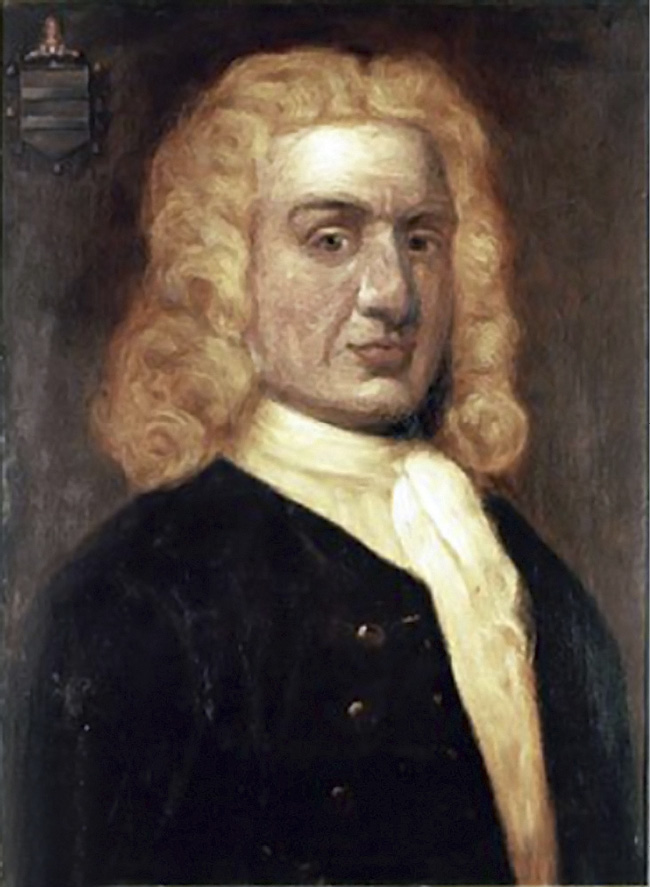
William Kidd
In December 1695, the governor of New York, aware of Kidds reputation as a successful Captain - and one loyal to the English crown - requested that he set sail on a voyage to rid certain waters of pirates who had been stealing cargo that had belonged to the British. Kidd could not have declined the request even if he had wanted to, as this would have been seen as extremely disrespectful to King William III himself.
Having accepted the request, a number of noble lords raised money for Kidds expedition; these included some of the most powerful men in England. The Duke of Shrewsbury and the Earl of Oxford certainly stumped up a significant amount in support of the voyage, and rumour has it that even the King himself fronted some of the money. A letter of marque personally signed by the King was given to Kidd - this was essentially official permission to attack, board and loot ships considered enemies of the crown. In return, ten per cent of Kidds booty would be given to the king on his return.
Kidd chose a crew of 150 men for his new ship - the Adventure Galley - based on their loyalty and skill. The ship was one of the best of her age; she weighed almost three hundred tons and was equipped with thirty-four cannons. To assist her in battles during calm winds, she could even be manoeuvred using oars.
Sadly, the voyage didnt get off to a great start. For reasons known only to Kidd and his crew, as they set sail down the River Thames bound for the high seas, they failed to salute a Navy yacht that was anchored at Greenwich (it was customary at the time to do this). The yacht fired a warning shot across the bows of the Adventure Galley , demanding the crew show respect. Insulted by this heavy-handed action, the crew turned away from the naval Yacht, pulled down their trousers and slapped their bottoms in a display of impudence. This didnt go down well with the captain of the yacht, who duly ordered Kidds ship to halt, and forced many crewmembers into immediate naval service (something they were technically permitted to do). This meant that Kidd sailed to America somewhat short of men.
From here onwards, Kidd really didnt have much luck at all. Arriving in New York (after having captured a French vessel during the voyage despite being undermanned) Captain Kidd was forced to take on crew-members who were less loyal than he would have liked - many in all likeliness would have been former pirates and hardened criminals. The first major problem occurred when they reached the Comoros whilst sailing for the Cape of Good Hope - a third of the crew died after an outbreak of cholera.
To make matters worse, Kidd hadnt found the pirates he had expected to encounter off the coast of Madagascar, and therefore his income was way under expected budget. He then sailed to the southern entrance of the Red Sea, another regular pirate haunt... but even there he failed to find ships to loot. The Captains remaining crew were beginning to get angry and restless, and - as many of them came from a rather shady background - began to question why he refused to attack ships when he had the chance, Kidds quite reasonable argument being that they were friendly vessels! Many of the crew deserted when they had the chance, and those still on board constantly made threats of mutiny.
Things came to a head one particular day when Gunner William Moore spotted a ship and urged Captain Kidd to attack it. Kidd declined, pointing out that it sailed under a Dutch flag and therefore attacking it was sure to anger King William, who himself was Dutch born. Kidds temper was raised, and he called Moore a lousy dog. The insults continued back and forth, until the Captain grabbed an iron bucket and struck the Gunner, fracturing his skull. Moore died the next day.
Another unfortunate incident was to follow. In 1698, he spotted a ship which appeared to be a suitable target. The Quedagh Merchant was an Armenian vessel, loaded with valuable cargo that included silver, gold and expensive silks. On capturing her, it was found that the Captain was an Englishman and Kidd tried to persuade his crew to hand the ship back and retreat. Sadly, they did not and Kidd had no other option that to let them keep their prize rather than face mutiny (and possibly death at their hands). This decision - despite having almost no choice in making it - was to be Kidds downfall. When news of the Quedagh Merchant s capture reached England, naval commanders (who already had a poor view of Kidd after the Thames incident) agreed to pursue and seize him for notorious piracies.
Next page




